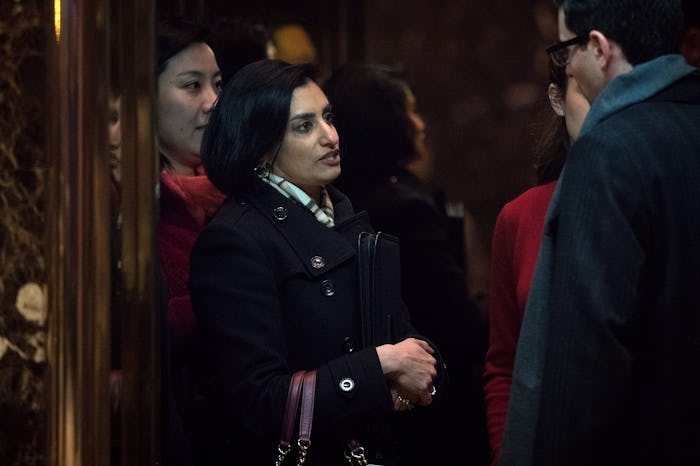Life

How Seema Verma Could Affect Low-Income Mothers
On Inauguration Day, President Donald Trump nominated a woman named Seema Verma to be administrator of the Centers for Medicare and Medicaid Services. And while it may seem like a step in the right direction for Trump to nominate not only a woman but a woman of color for the post, if you look more closely at Verma's track record, she may not bring about a change to healthcare that would benefit marginalized individuals. Based on statements she's made in the past, many are wondering how Seema Verma could affect low-income mothers and families, and with good reason.
Verma is the “architect” of the Healthy Indiana Plan, a privatized, conservative form of Medicaid established in 2007 that now-Vice President Pence expanded using Affordable Care Act funding eight years later when he was governor of the state of Indiana. Medicaid reform plans such as HIP necessitate people living just above the poverty line to pay more for the health care they receive than they would under regular Medicaid. For the plan in Indiana, enrollees have to make monthly payments into “POWER Accounts” modeled after health savings accounts that they use to pay costs out-of-pocket. Researchers at the Kaiser Family Foundation have said it's too early to tell if the program has, "led to a more efficient use of health care services and better health outcomes," according to the Indy Star.
Specifically, something Verma said while testifying before a House subcommittee in 2013 is raising eyebrows. Poor people, she said, are well-suited for programs like the Healthy Indiana Plan, that make them scrape together the money they need to keep their coverage. She's quoted as saying, according to the Huffington Post:
They are perhaps the best consumers of a dollar. They’ve had experience stretching a dollar.
Poor people would, of course, include low-income mothers and families. Under the plan Verma helped implement, they would have to pay into a health savings account, and could face dire consequences if they miss a payment. Reportedly, one woman lost coverage for herself and her three children when she missed a payment of $1, according to Gizmodo. That dollar was the difference between she and her children having healthcare or not.
And when Sen. Debbie Stabenow of Michigan asked Verma whether women should have to pay more for healthcare — under the Affordable Care Act being a woman is not considered a "pre-existing condition," but a repeal or reform could change that — Verma's answer was not clear..
"Should we as women be paying more for healthcare because we're women?," Stabenow questioned, according to the video she posted to her Twitter, above.
"I think that women should be able to make the decisions that work best for them," Verma replied. And when Stabenow pressed her about things like healthcare covering basic maternity care, Verma continued, as shown in the video:
I think that women have to make the decisions that work best for them and their family. Some women might want maternity coverage and some women might not want it, might not choose it, might not feel like they need that.
Which... still doesn't answer Stabenow's question, and doesn't bode well for coverage for basic needs for women, mothers, and families continuing to be covered with Verma's possible role in overhauling healthcare.
Seema Verma was questioned before the U.S. Senate Finance Committee on Thursday. When her nomination is processed by the Senate Finance Committee, the full Senate will take a vote. If you have concerns about her confirmation, it might be a good time to let your senator know.